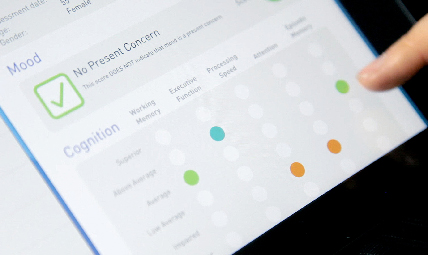The amount of time it takes to diagnose dementia could be reduced from the current 18 months to just three months, thanks in part to technology originally developed at the University of Cambridge.
Beginning in early 2013, researchers at two new Brain Health Centres will aim to demonstrate that time to diagnosis can be cut by an average of 15 months, and if deployed nationally from 2014, can raise diagnosis rates themselves closer to the Prime Minister’s Dementia Challenge target of 80% – a doubling of the current average rate. The creation of the centres was announced earlier this week by the Prime Minister.
There are currently 800,000 individuals living with dementia in the UK, but fewer than half of them have been formally diagnosed. By aiding early and rapid diagnosis, the technologies developed by Cambridge Cognition, a Cambridge based developer of neuropsychological tests, and London-based imaging company IXICO could add up to 18 months of independent living for dementia patients.
By testing non-verbal episodic memory, CANTABmobile gives a sensitive and specific result at a very early stage, which is vital for choosing the appropriate treatment in order to maintain quality of life.
Professor Barbara Sahakian
The initial assessment for determining a patient’s risk of developing dementia will be conducted by GPs using Cambridge Cognition’s CANTABmobile software on an iPad. The test, which takes less than ten minutes, differentiates between patients with normal and abnormal memory.
Patients who require further investigation will be referred to the Brain Health Centres, where they will receive an MRI scan and a more detailed version of the CANTABmobile test. The combined results will give a traffic light call to action for the Brain Health Centre staff to communicated back to the patient’s GP.
The CANTAB series of tests are based on the research of Professor Barbara Sahakian and Professor Trevor Robbins of the University of Cambridge MRC /Wellcome Trust Behavioural and Clinical Neuroscience Institute. CANTAB Pal (Paired Associates Learning), which was one of the first tests to use touchscreen technology in this way, tests episodic memory, which helps us to remember objects in space: where we left our keys or parked our car, for example. A decline in episodic memory is the earliest and most common indicator of dementia.
“The pen and paper neuropsychological tests currently used in most NHS Memory Clinics are not sensitive enough to detect dementia early,” says Professor Sahakian. “They are highly arbitrary, relying on word lists and therefore affected by education and strategy use. By testing non-verbal episodic memory, CANTABmobile gives a sensitive and specific result at a very early stage, which is vital for choosing the appropriate treatment in order to maintain quality of life.”
CANTAB was licensed to Cambridge Cognition, who have developed the test and adapted it for the iPad and other touchscreen devices. It is currently used in more than 500 universities, research institutes and hospitals in more than 50 countries.
A number of drugs to treat dementia by stopping neurodegeneration are currently in development, but they work most effectively for mild to moderate states of dementia, further emphasising the importance of early detection.
“We need to think about brain health across the whole life span,” says Professor Sahakian. “Nutrition, exercise, education and early detection all play a part in ensuring that individuals have the best quality of life for as long as possible.”
The two companies have worked with King’s College London, Imperial College London and the Brighton and Sussex Medical School run jointly by the Universities of Brighton and Sussex, to develop the Brain Health Centre project to be trialled in two areas in the south of England in early 2013. One hundred patients will initially be assessed at each centre.











